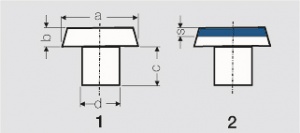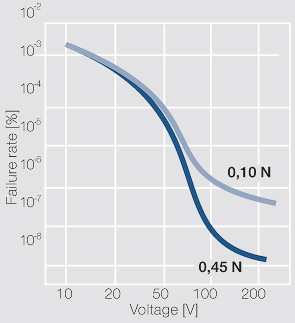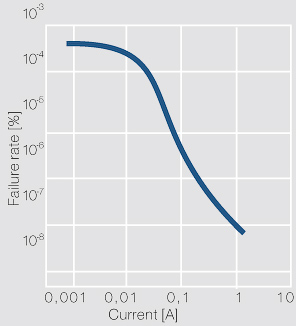Difference between revisions of "General Rules for Dimensioning of Contacts"
From Electrical Contacts
Doduco Admin (talk | contribs) (→General Rules for Dimensioning of Contacts) |
Doduco Admin (talk | contribs) |
||
| Line 77: | Line 77: | ||
| − | |||
| − | |||
| − | |||
| − | |||
| − | |||
| − | |||
| − | |||
| − | |||
| − | |||
| − | |||
| − | |||
| − | |||
| − | |||
| − | |||
| − | |||
| − | |||
| − | |||
| − | |||
| − | |||
| − | |||
| − | |||
| − | |||
| − | |||
| − | |||
| − | |||
| − | |||
| − | |||
| − | |||
| − | |||
| − | |||
| − | |||
| − | |||
| − | |||
| − | |||
| − | |||
| − | |||
Latest revision as of 14:01, 26 January 2023
General Rules for Dimensioning of Contacts
Recommended Minimum Contact Forces at Slightly Sliding Contact Make:
| Gold | 0.03 N |
| Silver | 0.1 N |
| Tungsten | 0.5 N |
Contact Force Recommendations:
| Signal relays | ≥ 3 cN |
| AC power relays | ≥ 20 cN |
| Automotive relays | ≥ 20 cN |
| Motor switches (Contactors) (Silver – Metal oxide contacts) |
0.05 - 0.08 N/A |
| Power switches | 0.1 - 0.2 N/A |
| Connectors (Gold coating) |
≥ 30 cN/contact element |
| Connectors (Silver coating) |
≥ 50 cN/contact element |
| Connectors (Tin coating) |
≥ 1 N/contact element |
General Rules for Dimensioning of Contact Rivets
| Dimensioning | Solid Rivets (1) | Composite Rivets (2) |
|---|---|---|
| a : d | 1.5 : 1 bis 2.5 : 1 | 2 : 1 bis 2.5 : 1 |
| a : b | 2.5 : 1 bis 10 : 1 | 3 : 1 bis 5 : 1 |
| c : b | ≥ 1 : 1 | ≥ 1 : 1 |
| b : s | ≥ 2 : 1 | |
| smin | ≈ 0.3 mm |
Failure Probability of Single and Double (Bifurcated) Contacts (according to Thielecke)
| Contact force[N] | Single contact | |||
|---|---|---|---|---|
| Ag | AuNi 5, Pt | Ag | AuNi 5, Pt | |
| 0.04 | 1 x 10-4 | 2 x 10-8 | ||
| 0.1 | 2 x 10-3 | 4 x 10-5 | 8 x 10-5 | 8 x 10-9 |
| 0.2 | 1 x 10-4 | 8 x 10-6 | 4 x 10-6 | 4 x 10-8 |
| 0.3 | 5.5 x 10-6 | 1.5 x 10-6 | 1.8 x 10-7 | 3.2 x 10-10 |



